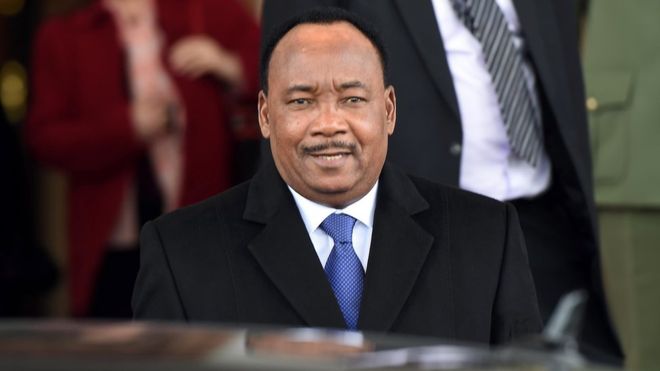President of Niger Republic, Mahamadou Issoufou, has called for a “global response” to the problems of land degradation that threaten the arid Sahel belt.

Addressing a meeting of the Climate Commission for the Sahel Region at the United Nations on Sunday, September 19, 2019, Issoufou said the region’s 250 million people are struggling with drought, desertification and other impacts of climate change.
“The situation in the Sahel has global stakes, and it requires a global response,” said Issoufou.
Niger’s farmers lose 100,000 hectares of arable land every year, said Issoufou, as unpredictable rainfall, extreme temperatures and droughts are drying up watering holes that livestock herders relied upon.
“It’s always possible to reverse the trend and reverse those challenges, but that requires adaptive efforts that are sustainable and collective action with the help of our partners,” said Issouffou.
The coast-to-coast Sahel belt stretches from the Atlantic Ocean to the Red Sea, passing through Senegal, Mauritania, Mali, Burkina Faso, Algeria, Niger, Nigeria, Cameroon, Chad, Sudan, Eritrea, and other African countries.
At the meeting, UN secretary-general, Antonio Guterres, said that the Sahel’s population contributes very little to climate change and yet it “suffers the most” from rising temperatures and unpredictable rainfall.
“Famers and breeders who used to live in harmony now fight against each other for lands that are more and more reduced, and this is making an unstable situation even worse,” said Guterres.
“Fights between communities are getting worse and give way to a lot of death and the displacement of populations.”
In a written statement, the President of the African Development Bank (AfDB), Dr. Akinwumi Adesina, called the Sahel the “frontline of Africa’s battle against climate change.”
“In Africa, we have millions of farmers suffering from the devastating impact of drought in the Sahel. It is not just their livelihoods that are at stake, but their communities, but their ways of life,” Adesina said, calling for financial interventions to face up to this critical challenge of our time.
“For too long, we have been short-changed by climate change. But we can no longer be short-changed by climate finance,” Adesina said in his remarks.
This past decade, the bank has supported more than $2 billion of investment in the region and has pledged $1.3 billion more towards the Sahel Commission’s investment plan, which will run between 2018 and 2030.
The bank has also committed $20 million for the project preparation of the solar energy scheme Desert to Power, which will generate 10,000 MW of clean electricity for the region’s 250 million people.
The bank says it is determined to turn the vast Sahel desert into the next renewable energy powerhouse.
The bank’s vision of the Sahel is one of green growth and prosperity founded on clean, reliable and affordable energy systems that power households, industry, and commerce while securing resilience in the face of climate change.
Adesina praised the millions of young climate activists who protested from Australia to Iceland on Friday in a global climate strike to pressure world leaders to redouble their efforts on global warming.
“Their voices still echo and will continue to do so. Their generation bears the brunt of decades of neglect and inaction. And so it is only right that they should have a voice and a seat at the table of climate change,” Adesina said.
